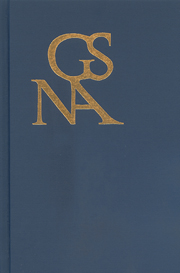Book contents
- Frontmatter
- Contents
- Special Section on Goethe's Lyric Poetry
- Introduction: New Approaches to Goethe's Lyric Poetry
- Intimacy, Morality, and the Inner Problematic of the Lyric
- Beyond the Poem: Strategies of Metapoetic Reflection in Goethe's Erster Weimarer Gedichtsammlung
- Meistersänger als Beruf: The Maieutics of Poetic Vocation in “Erklärung eines alten Holzschnittes …”
- Song or Narration?: Goethe's Mignon
- The Sucking Subject: Structural Ambiguities of Goethe's “Auf dem See” in Literary and Linguistic Perspective
- “Höhere Begattung,” “höhere Schönheit”: Goethe's Homoerotic Poem “Selige Sehnsucht”
- Poetry after Faust
- Forms of Knowledge/Knowledge of Forms: The Epistemology of Goethe's West-östlicher Divan and Cavellian Skepticism
- Im flüßgen Element bin und wieder schweifen: Development and Return in Goethe's Poetry and Hegel's Philosophy
- Goethe's Historical Particularism and the “Right Hand” of History: Early Modern State Building, Nobility, and the Feud in Götz von Berlichingen
- Where Are the Mountains?: Johann Jacob Bodmer and the “Pre-Kantian Sublime”
- The Politics of Aesthetic Humanism: Schiller's German Idea of Freedom
- Romanticism's Old German as Stepping-Stone to Goethe's World Literature
- Book Reviews
Romanticism's Old German as Stepping-Stone to Goethe's World Literature
from Special Section on Goethe's Lyric Poetry
Published online by Cambridge University Press: 05 October 2013
- Frontmatter
- Contents
- Special Section on Goethe's Lyric Poetry
- Introduction: New Approaches to Goethe's Lyric Poetry
- Intimacy, Morality, and the Inner Problematic of the Lyric
- Beyond the Poem: Strategies of Metapoetic Reflection in Goethe's Erster Weimarer Gedichtsammlung
- Meistersänger als Beruf: The Maieutics of Poetic Vocation in “Erklärung eines alten Holzschnittes …”
- Song or Narration?: Goethe's Mignon
- The Sucking Subject: Structural Ambiguities of Goethe's “Auf dem See” in Literary and Linguistic Perspective
- “Höhere Begattung,” “höhere Schönheit”: Goethe's Homoerotic Poem “Selige Sehnsucht”
- Poetry after Faust
- Forms of Knowledge/Knowledge of Forms: The Epistemology of Goethe's West-östlicher Divan and Cavellian Skepticism
- Im flüßgen Element bin und wieder schweifen: Development and Return in Goethe's Poetry and Hegel's Philosophy
- Goethe's Historical Particularism and the “Right Hand” of History: Early Modern State Building, Nobility, and the Feud in Götz von Berlichingen
- Where Are the Mountains?: Johann Jacob Bodmer and the “Pre-Kantian Sublime”
- The Politics of Aesthetic Humanism: Schiller's German Idea of Freedom
- Romanticism's Old German as Stepping-Stone to Goethe's World Literature
- Book Reviews
Summary
“So wie jetzt wurden die alten noch nie gelesen und übersetzt.” Ludwig Tieck's claim, raised in the introduction to his edition Minnelieder aus dem Schwaebischen Zeitalter (1803), bears witness to the renewed attention the so-called Old German [altdeutsche] literature received around 1800. The rise of nationalism in the wake of the napoleonic occupation and the quest for a German identity fueled the interest in the literary heritage that extended, as understood in the Age of Goethe, from the earliest monuments of the German language to the literature of the seventeenth century. Working against the backdrop of the Romantic project, several editions and collections, each varying in shape and design, aimed at incorporating the premodern literature into the poetic canon—among them Jacob and Wilhelm Grimm's Kinder- und Hausmärchen (1812-15), Joseph Görres's Die teutschen Volksbücher (1807), Ludwig Tieck's edition of Minnesang poetry, and Achim von Arnim and Clemens Brentano's collection Des Knaben Wunderhorn (1806-8), which was subtitled “die alten deutschen Lieder” and dedicated to Goethe. The classical Goethe, nonetheless, resisted all Romantic wooing and remained an uninterested bystander. The Romantics were, to his mind, once again following in his footsteps; in other words, they were venturing into territory he had explored before (in his Sturm und Drang phase) but long since left. A return, he seemed convinced, would mean a regression. Not until his aesthetic reorientation after the death of Schiller, and the start of his biographical projects, did Goethe reconsider his reservations.
- Type
- Chapter
- Information
- Goethe Yearbook 20 , pp. 247 - 264Publisher: Boydell & BrewerPrint publication year: 2013

